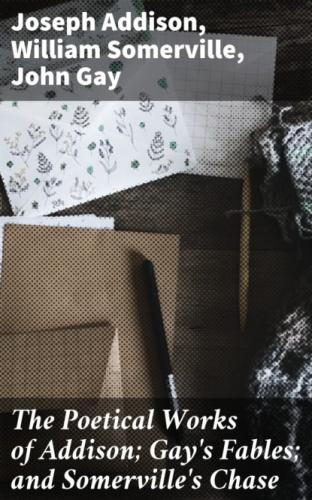In restless whirls, the sport of every blast,
_250
They carry stones to poise them in their flight,
As ballast keeps the unsteady vessel right.
But, of all customs that the bees can boast,
'Tis this may challenge admiration most;
That none will Hymen's softer joys approve,
Nor waste their spirits in luxurious love,
But all a long virginity maintain,
And bring forth young without a mother's pain:
From herbs and flowers they pick each tender bee,
And cull from plants a buzzing progeny;
_260
From these they choose out subjects, and create
A little monarch of the rising state;
Then build wax kingdoms for the infant prince,
And form a palace for his residence.
But often in their journeys, as they fly,
On flints they tear their silken wings, or lie
Grovelling beneath their flowery load, and die.
Thus love of honey can an insect fire,
And in a fly such generous thoughts inspire.
Yet by repeopling their decaying state,
_270
Though seven short springs conclude their vital date,
Their ancient stocks eternally remain,
And in an endless race their children's children reign.
No prostrate vassal of the East can more
With slavish fear his haughty prince adore;
His life unites them all; but, when he dies,
All in loud tumults and distractions rise;
They waste their honey and their combs deface,
And wild confusion reigns in every place.
Him all admire, all the great guardian own,
_280
And crowd about his courts, and buzz about his throne.
Oft on their backs their weary prince they bear,
Oft in his cause, embattled in the air,
Pursue a glorious death, in wounds and war.
Some, from such instances as these, have taught,
'The bees' extract is heavenly; for they thought
The universe alive; and that a soul,
Diffused throughout the matter of the whole,
To all the vast unbounded frame was given,
And ran through earth, and air, and sea, and all the deep of heaven;
_290
That this first kindled life in man and beast,
Life, that again flows into this at last.
That no compounded animal could die,
But when dissolved, the spirit mounted high,
Dwelt in a star, and settled in the sky.'
Whene'er their balmy sweets you mean to seize,
And take the liquid labours of the bees,
Spurt draughts of water from your mouth, and drive
A loathsome cloud of smoke amidst their hive,
Twice in the year their flowery toils begin,
_300
And twice they fetch their dewy harvest in;
Once, when the lovely Pleiades arise,
And add fresh lustre to the summer skies;
And once, when hastening from the watery sign,
They quit their station, and forbear to shine.
The bees are prone to rage, and often found
To perish for revenge, and die upon the wound
Their venomed sting produces aching pains,
And swells the flesh, and shoots among the veins.
When first a cold hard winter's storms arrive,
_310
And threaten death or famine to their hive,
If now their sinking state and low affairs
Can move your pity, and provoke your cares,
Fresh burning thyme before their cells convey,
And cut their dry and husky wax away;
For often lizards seize the luscious spoils,
Or drones, that riot on another's toils:
Oft broods of moths infest the hungry swarms,
And oft the furious wasp their hive alarms
With louder hums, and with unequal arms;
_320
Or else the spider at their entrance sets.
Her snares, and spins her bowels into nets.
When sickness reigns, for they as well as we
Feel all the effects of frail mortality,
By certain marks the new disease is seen,
Their colour changes, and their looks are thin;
Their funeral rites are formed, and every bee
With grief attends the sad solemnity;
The few diseased survivors hang before
Their sickly cells, and droop about the door,
_330
Or slowly in their hives their limbs unfold,
Shrunk up with hunger, and benumbed with cold;
In drawling hums the feeble insects grieve,
And doleful buzzes echo through the hive,
Like winds that softly murmur through the trees,
Like flames pent up, or like retiring seas.
Now lay fresh honey near their empty rooms,
In troughs of hollow reeds, whilst frying gums
Cast round a fragrant mist of spicy fumes.
Thus kindly tempt the famished swarm to eat,
_340
And gently reconcile them to their meat.
Mix juice of galls, and wine, that grow in time
Condensed by fire, and thicken to a slime;
To these, dried roses, thyme, and ccntaury join,
And raisins, ripened on the Psythian vine.
Besides, there grows a flower in marshy ground,
Its name amellus, easy to be found;
A mighty spring works in its root, and cleaves
The sprouting stalk, and shows itself in leaves:
The flower itself is of a golden hue,
_350
The leaves inclining to a darker blue;
The leaves shoot thick about the flower, and grow
Into a bush, and shade the turf below:
The plant in holy garlands often twines
The altars' posts, and beautifies the shrines;
Its taste is sharp, in vales new-shorn it grows,
Where Mella's stream
